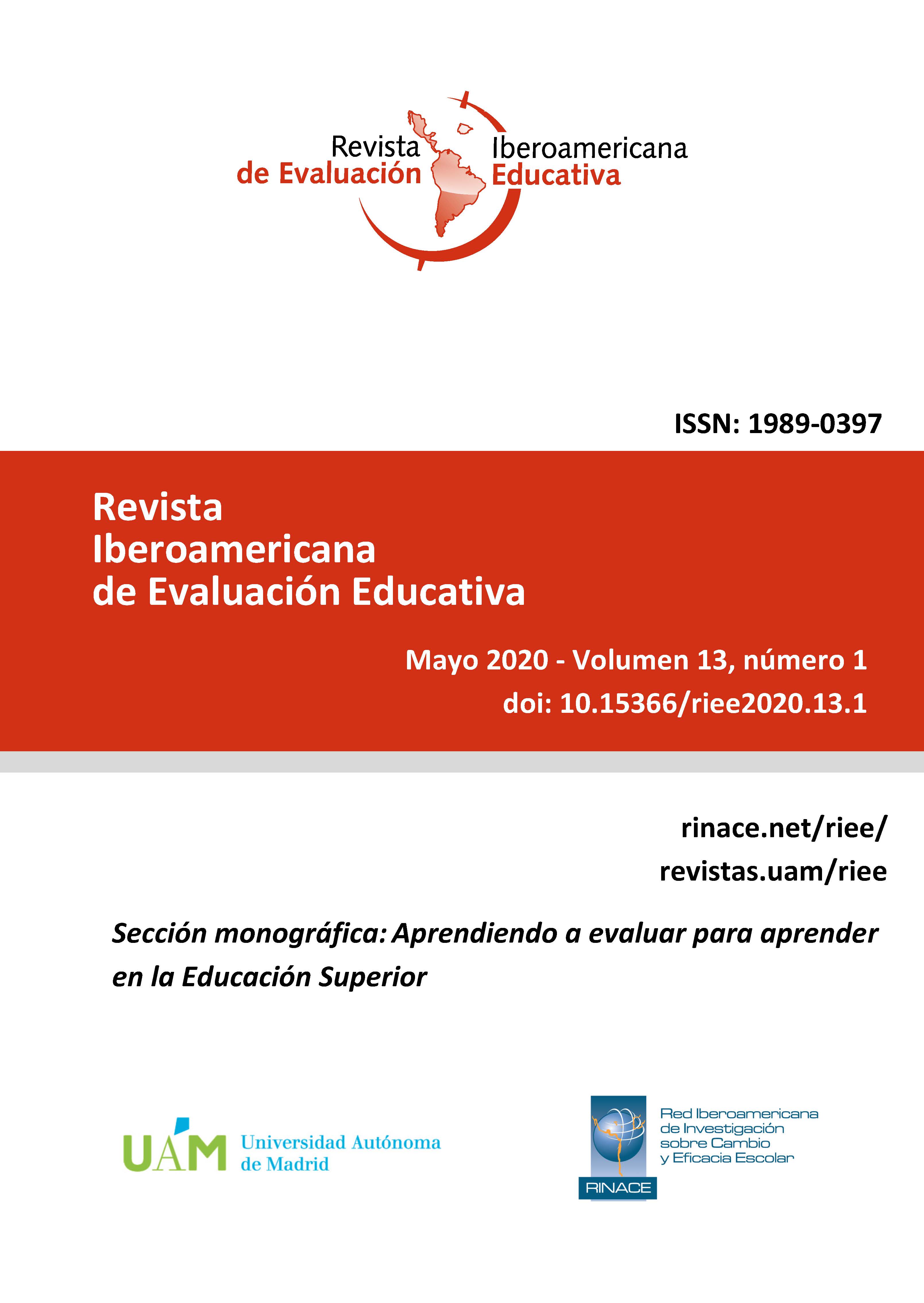Intelligent Evaluation System to Measure Mathematical Reasoning Skills
Keywords:
Cognitive processes, Adaptive computerized test, Algorithm of intelligent evaluation, Adaptive algorithmCopyright (c) 2020 Iberoamerican Journal of Educational Evaluation

This work is licensed under a Creative Commons Attribution-NonCommercial-NoDerivatives 3.0 Unported License.
Abstract
This research work provides the basis for the design, development and implementation of an intelligent evaluation system on the bases of a Computerized Adaptive Test. The development of this adaptive test prototype will allow the measurement of mathematical reasoning skills, incorporating to the final result, a cognitive profile that can be used to monitor the academic performance of students throughout their stay at the institution of higher education. The theoretical part provides the basic principles of an adaptive test, the psychometry of the items including their difficulty, discrimination and predictability; the construction of performance levels from the cognitive processes based on Bloom's Taxonomy, as well as the description and design of an intelligent algorithm for the selection of items. For the experimental part, items calibrated and tested in written tests applied to a sample of more than 10,000 students were used. In addition, the development of the intelligent evaluation system using a three-level client-server architecture, implemented in the java programming language, using MySQL as a database management system and HTML for the user interface is explained and finally, some of the results obtained when implementing the system in a group of students are provided.
Downloads
References
Backhoff, E., Ibarra, M. y Rosas, M. (1996). Desarrollo y validación del sistema computarizado de exámenes (sicodex). Revista de la Educación Superior, 25(1), 41-54.
Barrada, J. R., Olea, J., Ponsoda, V. y Abad, F. J. (2010). A method for the comparison of item selection rules in computerized adaptive testing. Applied Psychological Measurement, 34(6), 438-452. https://doi.org/10.1177/0146621610370152
Bass, L., Clements, P. y Kazman, R. (2003). Software architecture in practice. Reading, MA: Addison-Wesley.
Belloch, C. (2004). Recursos tecnológicos para la evaluación psicoeducativa. Valencia: Universidad de Valencia.
Bloom, B. S. (1956). Taxonomy of Educational Objectives, Handbook: The Cognitive Domain. Nueva York, NY: David McKay.
Chang, Y. I. y Ying, Z. (2004). Sequential estimation in variable length computerized adaptive testing. Journal of Statistical Planning and Inference, 121(2) 249-264. https://doi.org/10.1016/S0378-3758(03)00119-8
Chávez, C. y Saade, A. (2010). Procedimientos básicos para el análisis de reactivos. Ciudad de Mexico: Centro Nacional de Evaluación para la Educación Superior.
Díaz, J. O., Gil, V. P. y Prieto, G. (1999). Tests informatizados: fundamentos y aplicaciones. Madrid: Universitas.
Fernández, J. M. (2010). Las teorías de los tests: teoría clásica y teoría de respuesta a los ítems. Papeles del Psicólogo, 31(1), 57-66.
Garca, J. E. (2016). La introducción de la escala de inteligencia de stanford-binet en el Paraguay/the introduction of the stanford-binet intelligence scale in Paraguay. Interacciones. Revista de Avances en Psicología, 2(1), 65-83. https://doi.org/10.24016/2016.v2n1.28
Gil, V. P., Adanes, G. P. y Díaz, J. O. (2000). Test informatizados. Fundamentos y aplicaciones. Psicothema, 12(2), 321-322.
Hambleton, R., Swaminathan, H. y Rogers, H. (1985). Principles and applications of item response theory. Boston, MA: Kluwer Academic Publisher. https://doi.org/10.1007/978-94-017-1988-9
Hambleton, R. K., Zeal, J. N. y Pieters, J. P. (1991). Computerized adaptive testing: Theory, applications, and standards. Advances in Educational and Psychological Testing: Theory and Applications, 2, 341-366. https://doi.org/10.1007/978-94-009-2195-5_12
Hontangas Beltran, P. M. (2000). Los tests adaptativos informatizados en la frontera del siglo XXI: una revisión. Metodología de las Ciencias del Comportamiento, 2(2), 183-216.
Jodoin, M. G., Zenisky, A. y Hambleton, R. K. (2006). Comparison of the psychometric properties of several computer-based test designs for credentialing exams with multiple purposes. Applied Measurement in Education, 19(3), 203-220. https://doi.org/10.1207/s15324818ame1903_3
Lord, F. M. (1980). Applications of item response theory to practical testing problems. Nueva York, NY: Routledge.
Luecht, R., Brumeld, T. y Breithaupt, K. (2006). A test let assembly design for adaptive multistage tests. Applied Measurement in Education, 19(3), 189-202. https://doi.org/10.1207/s15324818ame1903_2
Muñiz, J. (1997). Introducción a la teoría de respuesta a los ítems. Madrid: Pirámide.
Olea, J. y Ponsoda, V. (1998). Evaluación informatizada en contextos de aprendizaje. Nuevas Tecnologías para el Aprendizaje, 3(1), 161-175.
Pinsach, J. R. y Dieguez, E. D. (1999). Tests adaptativos informatizados: Estructura y desarrollo. En J. Olea, V. Ponsoda y G. Prieto (Eds.), Tests informatizados: Fundamentos y aplicaciones, (pp. 127-162). Madrid: Piramide.
Pressman, R. S. y Troya, J. M. (1988). Ingeniería del software. Madrid: McGrwa-Hill.
Prieto, G. y Delgado, A. R. (2003). Análisis de un test mediante el modelo de Rasch. Psicothema, 15(1), 94-100.
Sierra-Matamoros, F. A., Valdelamar-Jiménez, F., Hernandez-Tamayo, F. A. y Sarmiento-García, L. M. (2007). Test adaptativos informatizados. Avances en Medición, 5, 157-162.
Simanca Herrera, F. y Abuchar Porras, A. (2014). AEI - Algoritmo de Evaluación Inteligente. Virtual Educa Innovación, competitividad y desarrollo. Lima: Feijóo.
Sokal, R. R. y Michener C. D. (1958). A statistical method for evaluating systematic relationships [J]. Univ. Kans. Sci. Bull, 28, 1409-1438.
Toledo, G., Mezura-Godoy, C., Cruz-Ramírez, N. y Benítez-Guerrero E. (2013): Modelo de Evaluación Adaptativa y Personalizada Mediante Razonamiento Probabilista. 8va Conferencia Latinoamericana de Objetos y Tecnologías de Aprendizaje. Valdivia: Ediciones Chile.

